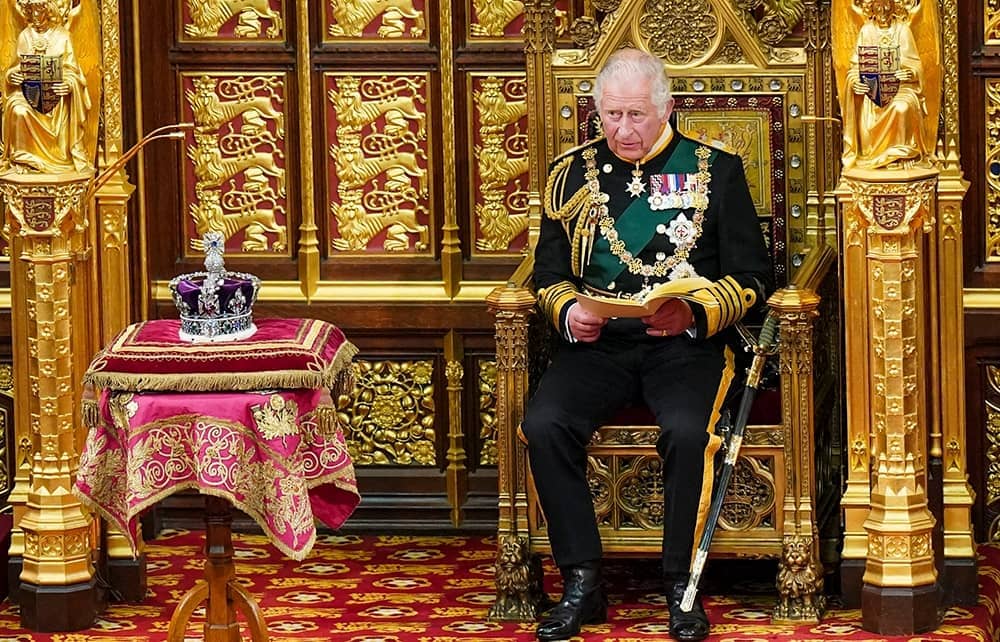When I was a lobby journalist, I never went to the State Opening of Parliament. I much regret it, because when I finally went this week, as a peer, there was no Queen. The printed programme on our seats described itself as ‘The ceremonial to be observed at the Opening of Parliament by Her Majesty The Queen’, but in fact the Prince of Wales stood, or rather, sat in, because of his mother’s ‘mobility issues’. He read well, sticking to her understanding that to give any expressiveness to the Queen’s Speech would be to verge on constitutional impropriety. Imagine how inappropriate it would have been, for example, if the phrase ‘Her Majesty’s Government will level up’ had been uttered with any hint of enthusiasm. The Duke of Cambridge was in the chair to his father’s right, his expression in repose slightly melancholy. Between them, on a table, sat the Crown, like a box that must not be opened.
The occasion is a living, crowded, illustrated history lesson. It contains the classical elements of our polity – monarchy, bishops (wearing a sort of ermine fleece I had never noticed before), judges (wigged and robed), military (full dress uniform), foreign ambassadors and, of course, Lords, joined at the last minute by MPs below the bar. I found it all moving, not the less so for feeling slightly precarious and also, occasionally, comic. The bit I enjoyed most occurred in the Prince’s Chamber behind the throne. In marched the Yeoman of the Guard, sparklingly turned out. Then someone laid lighted lanterns in front of each and someone else shouted the order that the lanterns be taken up. This done, the Beefeaters slow-marched off to search the cellars for gunpowder, of which, I presume, they found none. If the whole thing does get blown up in our time, it will be accomplished not by explosives, but by bad ideology.
In his piece in this paper last week (‘Eton mess’), James Heale described a battleground at Eton between a woke leadership on the one hand and rebellious Old and current Etonians and some masters on the other. The premise of the article was that the present provost, Lord Waldegrave, is about to retire. His replacement in the post – a Crown appointment, and therefore one made on the advice of the Prime Minister – would be hotly contested along these ideological lines. Would Waldegrave’s successor get rid of his protégé headmaster, Simon ‘Trendy Hendy’ Henderson, Heale wondered? A prime objection to this thesis is that Waldegrave is not about to retire: he does not have to and he has no plans to do so.
But what of the underlying point about the ‘battle for the soul of Eton’? All independent educational institutions suffer tensions between modernisers and traditionalists. Jiggery-wokery certainly increases these. But I think Heale misses a key dimension. In recent years, the amount of regulation, ‘guidance’, ‘best practice’ and exterior inspections has exploded. This applies in all areas – health and safety, ‘safeguarding’, governance, ‘inclusion’, risk assessments etc. This is not the fault of any school, and no school can afford to ignore it. Therefore, the bureaucratic workload on staff has become quite appalling within a decade. It follows that good schools have appointed more staff to lift the burden off the men and women who have the most important job – the teaching and pastoral care (above all, at Eton, that offered by housemasters) of the pupils. The schools have little choice but to do this and would be even more criticised if they didn’t. Eton is lucky that it has the money to appoint enough people. Exterior reforms, many of which, taken singly, may have been good ideas, have been imposed with such prescriptiveness that they add up to oppression. They disrespect the very idea of independent institutions. Some inspectors, it would seem, simply want to stamp out boarding schools. Others detest schools with an actively religious ethos. I have written before about the plight of Ampleforth. It is not unique. Westminster cannot currently issue visas for foreign pupils because of alleged defects in its ‘relationship education’. Marlborough is in trouble for its methods of teacher recruitment. Independent schools’ collective fault is not wokery but their failure to campaign harder and more unitedly against this annexation by bureaucracy. A Conservative government should reverse what amounts to nationalisation by stealth.
When Harold Macmillan was prime minister, he took an extremely close interest in who should be provost of Eton, so close, I gather, that he actually considered appointing himself, and even holding the post while he was prime minister. (In the end, he contented himself with fitting the chancellorship of Oxford in with his day job.) I continue to believe that Boris Johnson will survive his current difficulties in office, but if the future starts looking bleak, would he – another Etonian prime minister – flirt with a similar fantasy (causing riotous controversy as he does so)?
As a Cambridge graduate, I receive Cam, the magazine for alumni. Its preoccupations tend to political correctness, but it frequently offers what one would expect – interesting, up-to-date information about our university. In the latest edition, however, there is an article headlined ‘This idea must die: grammar schools are a tool in promoting social mobility’ by Peter Mandler, professor of Modern Cultural History. One reason he advances for his anti-grammars thesis is that ‘sociologists agree’ with it. Why must Cantabs be told what to think and why must it always be thoughts such as this? I think of the thousands of grammar-school Cambridge graduates reading the article and feel sad. Their ‘lived experience’ disproves Professor Mandler’s argument, but has no voice in Cam.







Comments